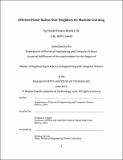Efficient fixed-radius near neighbors for machine learning
Author(s)
Walter, David Porter,III
Download1128186935-MIT.pdf (1.541Mb)
Other Contributors
Massachusetts Institute of Technology. Department of Electrical Engineering and Computer Science.
Advisor
Tomaso A. Poggio.
Terms of use
Metadata
Show full item recordAbstract
Deep learning has enabled artificial intelligence systems to move away from manual feature engineering and toward feature learning and better performance. Convolutional neural networks (CNNs) have especially demonstrated super-human performance in many vision tasks. One big reason for the success of CNNs is due to the use of parallelizable software and hardware to run these models, making their use computationally practical. This work is focused in the design and implementation of an efficient and parallel fixed-radius near neighbors program (FRNN). FRNN is a core component in a new type of machine learning model, object oriented deep learning (OODL), serving as a replacement for CNNs with goals of invariance, equivariance, interpretability, and computational efficiency that improve upon the abilities of CNNs. This efficient implementation of FRNN is a critical step in making OODL computationally efficient and practical.
Description
This electronic version was submitted by the student author. The certified thesis is available in the Institute Archives and Special Collections. Thesis: M. Eng., Massachusetts Institute of Technology, Department of Electrical Engineering and Computer Science, 2019 Cataloged from student-submitted PDF version of thesis. Includes bibliographical references (pages 61-63).
Date issued
2019Department
Massachusetts Institute of Technology. Department of Electrical Engineering and Computer SciencePublisher
Massachusetts Institute of Technology
Keywords
Electrical Engineering and Computer Science.